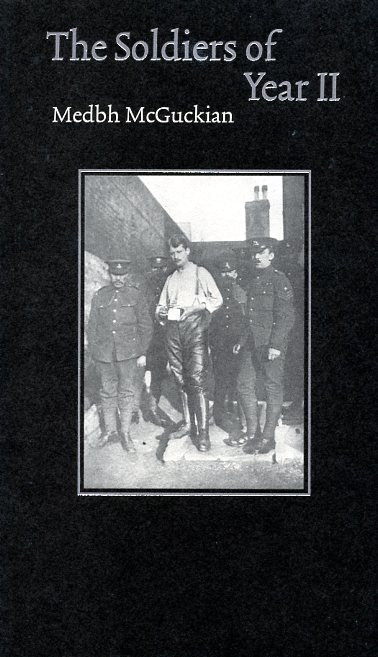The Soldiers of Year II by Medbh McGuckian
Medbh McGuckian
Wake Forest University Press, 2002
Reviewed by: Jordan Davis
January 26, 2003
\\ The Constant Critic Archive \\
About halfway through her new American collection, Irish poet Medbh McGuckian invokes the navel of the dream, the constant Freud used in The Interpretation of Dreams to balance his equation of waking life and the irrational:
I have had cloud
ravenous upon me as the mountain
in its wearing away, just before the dazzlement
of the later moonlight, charred as if off
water, corrupted sea-water, or Rhine-foam.
And here, beneath my foot, the dream’s navel,
a kind of central year holding always
by the heart the close power of the dust,
the many uses of earth. These remaining places,
how are they to be prepared for us,
the too-travelled path to word-house completeness?
(“Fourteenth Century Hours of the Virgin,” 77)
One hallmark of her style is a subliminally untoward syntax—it would be less ambiguous to have another as in either the first or second line of that quotation, for example; and does that last line refer to us, they, or something else altogether? Other standard feints include the eclipsed subject, non-standard compounds (“word-house” as above, but also “rainwalls” and “subwoods”) unconventional physical associations (“all I see are the living, / being pulled into full existence, / emerging as if from a cellar”) and cummingsesque mappings of qualities onto qualities (“Skywarm roads mix obsessions and withholdings / like a marriage of already lived years”).
Wake Forest University Press, which specializes in contemporary Irish poetry, lists six titles by McGuckian: 1988’s On Ballycastle Beach, Marconi’s Cottage (1992), Captain Lavender (1995), Selected Poems (1997), Shelmalier (1999), and The Soldiers of Year II. McGuckian is on my very short list of poets whose books I buy as soon as I’m aware they’re in print; somehow the selected slipped my radar, and along the way I misplaced my copy of Marconi’s Cottage. Despite the considerable efforts of Wake Forest UP, I find myself at an epistemological impasse when it comes to the poetry of other countries, especially that of Ireland—if I had to rely only on gatekeepers and kingmakers for my sense of what is possible and who’s finding it in the poetry of my own conflicted, loveable country, I would be a much closer follower of professional sports than I am. So it follows (or I imagine it does) that poetry written by those who hold other passports is not merely proposing that I find the emergency in it despite barriers of cultural and linguistic difference, but also that to get it I will have to throw myself on the mercy of a literary politics I’ve only been able to observe from a distance.
Disclaimers and hesitations don’t survive opening a McGuckian book at random:
I have experienced a wilderness
printed black on white.
Tarnished years of silver fever.
All my minds are weapons.I miss the tunic of rain that settled in
like an old heart complaint,
the polluted air so bracing,
the great non-meetings
wrapped up in politics.
(“Life as a Literary Convict”, SYII, 18)
While I’m impatient with the switcheroo of a wilderness being printed, unaware of what silver fever feels like at all let alone when it goes on for years, and predisposed to fear any construction that acknowledges the plurality of unity, I am taken in by that first stanza, by the charged flatness of its last word—call it hypnotism, or displacement, or mild intoxication. Intoxicated, I’m available to be tugged along by the very simple emotional gesture of missing something. But what? “Tunic of rain” gets both the feeling of wearing a soaking cloak and the sight of a gust of wind blowing through a downpour. The confusion in the rest of the stanza is apt—why miss something that’s like heart disease? (The familiarity of the jailer.) If the air’s not fresh, at least it’s cold. If no progress was made, at least there was the excitement of taking a side. These lines work through the prospect of peace after an unconscionably long hostility. And again, an unremarkable and unexpected word closes the stanza. The following stanzas have similarly imploded endings—cellar, childhood, cost, republicans, and the spectacular last stanza, describing what I’m guessing is the corpse of a British soldier killed in Northern Ireland:
He lies in his English envelope
like the Greek word for Greekness,
defender of Throne and Altar,
while the frontier is guarded
by the small wombs of two chickens.
(SYII, 19)
I don’t know whether she literally means oviducts, or that farmland is already taking back militarized zones, or whether she’s signaling that she’s dreaming the end of the troubles. McGuckian’s gestural poetics seduce the reader into multiple readings just to get enough sense of what gives such strong feelings. Definitive interpretations are less likely to occur than parallel experiences for even the most assiduous reader. This dreamy quality recalls the muted surrealism of Rene Char and Robert Desnos, whose introspection and wounded politics bear similarity to Yeats’s, or Rilke’s even. To tag McGuckian with any kind of experimentalist label, though, is to put in the background the irritable, fundamentally sexy reaching after meaning that her poems provoke.
————COMMENTS———————————————————————————————————————————
Scott Bramlett January 28, 2003 at 4:10 pm
I appreciated this review, in that it seemed to be fairly open-ended, more of an appraisal (would that more reviews be thus) than flat praise or denunciation. I think that criticism would serve its subjects and readers better by such a lack of didacticism, rather than by the critical tack of tutelage or lecture.
Also, I am curious as to how you got my email address.
Best regards.
Scott Bramlett
Reply from the editor:
For those of you who have similar curiosity about how you came to be on this list, be curious no more: The Constant Critic list used the Fence announcement list as its springboard. So that’s how.
